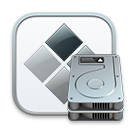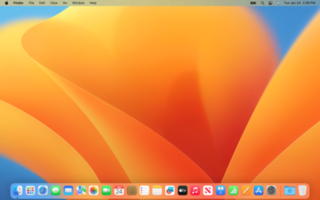
iDVD is a discontinued Mac application made by Apple, which can be used to create DVDs.

System 7 is the seventh major release of the classic Mac OS operating system for Macintosh computers, made by Apple Computer. It was launched on May 13, 1991, to succeed System 6 with virtual memory, personal file sharing, QuickTime, TrueType fonts, the Force Quit dialog, and an improved user interface.
FileVault is a disk encryption program in Mac OS X 10.3 Panther (2003) and later. It performs on-the-fly encryption with volumes on Mac computers.

Mac OS 8 is the eighth major release of the classic Mac OS operating system for Macintosh computers, released by Apple Computer on July 26, 1997. It includes the largest overhaul of the classic Mac OS experience since the release of System 7, approximately six years before. It places a greater emphasis on color than prior versions. Released over a series of updates, Mac OS 8 represents an incremental integration of many of the technologies which had been developed from 1988 to 1996 for Apple's overly ambitious OS named Copland. Mac OS 8 helped modernize the Mac OS while Apple developed its next-generation operating system, Mac OS X.

Connectix Corporation was a software and hardware company, noted for having released innovative products that were either made obsolete as Apple Computer incorporated the ideas into system software, or were sold to other companies once they became popular. It was formed in October 1988 by Jon Garber; dominant board members and co-founders were Garber, Bonnie Fought, and close friend Roy McDonald. McDonald was still Chief Executive Officer and president when Connectix finally closed in August 2003.

Mac OS X Leopard is the sixth major release of macOS, Apple's desktop and server operating system for Macintosh computers. Leopard was released on October 26, 2007 as the successor of Mac OS X Tiger, and is available in two editions: a desktop version suitable for personal computers, and a server version, Mac OS X Server. It retailed for $129 for the desktop version and $499 for Server. Leopard was superseded by Mac OS X Snow Leopard in 2009. Mac OS X Leopard is the last version of macOS that supports the PowerPC architecture as its successor, Mac OS X Snow Leopard, functions solely on Intel based Macs.

Disk Utility is a system utility for performing disk and disk volume-related tasks on the macOS operating system by Apple Inc.
The System folder is the directory in the classic Mac OS that holds various files required for the system to operate, such as fonts, system extensions, control panels, and preferences.
NetBoot was a technology from Apple which enabled Macs with capable firmware to boot from a network, rather than a local hard disk or optical disc drive. NetBoot is a derived work from the Bootstrap Protocol (BOOTP), and is similar in concept to the Preboot Execution Environment. The technology was announced as a part of the original version of Mac OS X Server at Macworld Expo on 5 January 1999. NetBoot has continued to be a core systems management technology for Apple, and has been adapted to support modern Mac Intel machines. NetBoot, USB, and FireWire are some of the external volume options for operating system re-install. NetBoot is not supported on newer Macs with T2 security chip or Apple silicon.

Boot Camp Assistant is a multi boot utility included with Apple Inc.'s macOS that assists users in installing Microsoft Windows operating systems on Intel-based Macintosh computers. The utility guides users through non-destructive disk partitioning of their hard disk drive or solid-state drive and installation of Windows device drivers for the Apple hardware. The utility also installs a Windows Control Panel applet for selecting the default boot operating system.
OmniDiskSweeper is a freeware disk space analyzer utility for macOS developed by The Omni Group, which recursively searches a filesystem and displays entries sorted and color-coded by size, from largest to smallest. Alternatives include DaisyDisk and GrandPerspective.

Time Machine is the backup mechanism of macOS, the desktop operating system developed by Apple. The software is designed to work with both local storage devices and network-attached disks, and is most commonly used with external disk drives connected using either USB or Thunderbolt. It was first introduced in Mac OS X 10.5 Leopard, which appeared in October 2007 and incrementally refined in subsequent releases of macOS. Time Machine was revamped in macOS 11 Big Sur to support APFS, thereby enabling "faster, more compact, and more reliable backups" than were possible previously.

Psystar Corporation was a company based in Miami, Florida, owned by Rudy and Robert Pedraza who sold "Open Computers" though one article claimed "Psystar, run by HyperMegaNet, based in Wolfsburg, Germany, currently ships to 23 destinations including the UK via delivery firm DHL."
MobileMe is a discontinued subscription-based collection of online services and software offered by Apple Inc. All services were gradually transitioned to and eventually replaced by the free iCloud, and MobileMe ceased on June 30, 2012, with transfers to iCloud being available until July 31, 2012, or data being available for download until that date, when the site finally closed completely. On that date all data was deleted, and email addresses of accounts not transferred to iCloud were marked as unused.

DasBoot is a software utility produced by SubRosaSoft.com Inc. It allows the user to create a bootable Mac OS X USB device for Mac OS X 10.5 and earlier. It is a freeware product. This live USB device can be used for diagnostic, repair, and recovery of Mac OS X systems.

Mac OS is the series of operating systems developed for the Macintosh family of personal computers by Apple Computer, Inc. from 1984 to 2001, starting with System 1 and ending with Mac OS 9. The Macintosh operating system is credited with having popularized the graphical user interface concept. It was included with every Macintosh that was sold during the era in which it was developed, and many updates to the system software were done in conjunction with the introduction of new Macintosh systems.

macOS Sierra is the thirteenth major release of macOS, Apple Inc.'s desktop and server operating system for Macintosh computers. The name "macOS" stems from the intention to unify the operating system's name with that of iOS, watchOS and tvOS. Sierra is named after the Sierra Nevada mountain range in California and Nevada. Its major new features concern Continuity, iCloud, and windowing, as well as support for Apple Pay and Siri.
Apple File System (APFS) is a proprietary file system developed and deployed by Apple Inc. for macOS Sierra (10.12.4) and later, iOS 10.3, tvOS 10.2, watchOS 3.2, and all versions of iPadOS. It aims to fix core problems of HFS+, APFS's predecessor on these operating systems. APFS is optimized for solid-state drive storage and supports encryption, snapshots, and increased data integrity, among other capabilities.

macOS Ventura is the nineteenth major release of macOS, Apple's operating system for Macintosh computers. The successor to macOS Monterey, it was announced at WWDC 2022 on June 6, 2022, and launched on October 24, 2022. macOS Ventura was succeeded by macOS Sonoma, which was released on September 26, 2023.











